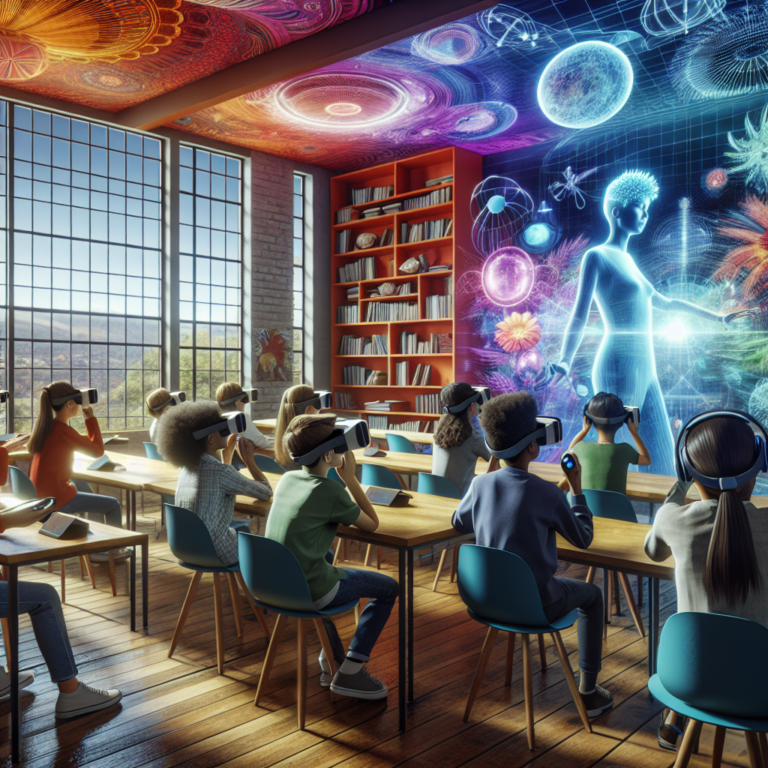Meta Education VR: Transforming College Learning with Virtual Reality
Introduction: Embracing Technology in Education
Meta has unveiled its Meta Education VR beta program, aiming to bring cutting-edge VR and mixed reality tools to a select group of universities and colleges across the United States and the United Kingdom. This initiative aspires to transform the college experience by providing educators, trainers, and administrators with a robust set of resources tailored to enhance teaching and learning outcomes.
The Evolution of Meta Education
Initially announced in May, the Meta Education VR program for Quest headsets has advanced into a thorough platform. This program enables educators to utilize a wide range of education-specific applications and features. It simplifies the management of multiple Quest devices, eliminating the need for teachers to configure each device individually in classroom environments.
Connections to Quest for Business
The Meta Education VR program shares similarities with the recently launched Quest for Business platform, which places a strong emphasis on the mass management and updating of Quest headsets. This resemblance underscores Meta’s commitment to making advanced technology readily available in educational contexts.
Colleges and Universities Participating in the Beta Program
Several prestigious institutions are taking part in the Meta Education VR beta program, including:
- Arizona State University
- Houston Community College
- Imperial College London
- Miami Dade College
- Morehouse College
- New Mexico State University
- San Diego State University
- Savannah College of Art & Design
- The University of Glasgow
- University of Iowa
- University of Leeds
- University of Miami
- University of Michigan
These institutions are crucial in providing constructive feedback, which will guide Meta in refining the program before its full launch. This collaborative process ensures that insights from real users significantly contribute to future developments.
Educator Insights: A Fresh Perspective on Learning
Educators participating in the beta testing express excitement about the potential of Meta Education VR in classroom settings. Here are some highlights from their experiences:
“The moment I put on a headset, it was clear that this is not the same as a screen or TV,” says Kim Grinfeder, a professor at the University of Miami. “We were crafting experiences, and I knew right away that this technology will change education—transforming how we teach and bringing the world into our classrooms.”
“Students are engaged meaningfully with the technology,” notes Rubén Durán, Director of Reality CoLab at Houston Community College. “Through our project Virtual Reality for Empathy, community organizations collaborate with HCC students to role-play scenarios, enhancing understanding and fostering empathy. Such immersion evokes emotions, vital for encouraging empathy.”
“We’re not replacing face-to-face interactions,” states Dr. Sean Hauze, Senior Director of Instructional Technology at San Diego State University. “Instead, we’re exploring extraordinary experiences, such as viewing Earth from space or diving into the ocean—adventures impossible for some students for various reasons.”
“We aim to normalize the use of extended reality,” emphasizes Thomas Merrick, Associate Director of VR/AR Initiatives at the University of Miami. “We believe XR will become as commonplace as laptops, making it essential for students to learn about it early on.”
“Meta maintains an active collaboration with us, regularly seeking our feedback,” shares Andrew Sedillo, Director of Microcredentials Instructional Design at New Mexico State University. “This consistent dialogue builds trust, showcasing Meta’s genuine interest in improving education.”
“I feel fortunate to collaborate with Meta in this project,” adds Dr. Muhsinah Morris, Metaversity Director at Morehouse College. “Their willingness to allow us to beta test is vital. It shows they value educator insights, enhancing the product for everyone.”
“Collaboration must include creators, developers, and educational institutions,” asserts Monica Arés, Executive Director of Imperial IDEA Lab at Imperial College London. “This merger of digital and physical worlds can unlock entirely new learning tools—exciting possibilities await!”
Looking Ahead: The Future of Meta Education
Meta plans to expand the reach of the Meta Education VR program this winter. This indicates that a broader public launch is on the horizon. As feedback continues to shape the initiative, it promises to revolutionize education by delivering engaging, immersive experiences for both students and educators. Through Meta Education VR, the learning landscape is poised to become more dynamic and inclusive, catering to the varied needs of learners worldwide.
The Role of Feedback in Advancing Educational Technology
The focus on educator feedback highlights a significant trend in educational technology: the collaboration between technology creators and users. This model ensures that the tools developed are not only innovative but also practical and effective in real-life educational settings. The testimonials from educators reinforce the necessity of integrating emerging technologies in ways that enhance learning, rather than merely replacing traditional practices.




0 Comments